
Biodiversity is declining rapidly throughout the world. The challenges of conserving the world’s species are perhaps even larger than mitigating the negative effects of global climate change.
Dealing with the biodiversity crisis requires political will and needs to be based on a solid scientific knowledge if we are to ensure a safe future for the planet.
This is the main conclusion from scientists from University of Copenhagen , after 100 researchers and policy experts from EU countries were gathered this week at the University of Copenhagen to discuss how to organize the future UN Intergovernmental Panel for Biodiversity and Ecosystem Services, IPBES – an equivalent to the UN panel on climate change (IPCC).
Species extinction and the degradation of ecosystems are proceeding rapidly and the pace is accelerating. The world is losing species at a rate that is 100 to 1000 times faster than the natural extinction rate.
Mass extinctions of species have occurred five times previously in the history of the world – last time was 65 million years ago when the dinosaurs and many other species disappeared. Previous periods of mass extinction and ecosystem change were driven by global changes in climate and in atmospheric chemistry, impacts by asteroids and volcanism.
Now we are in the 6th mass extinction event, which is a result of a competition for resources between one species on the planet – humans – and all others. The process towards extinction is mainly caused by habitat degradation, whose effect on biodiversity is worsened by the ongoing human-induced climate change .
“The biodiversity crisis – i.e. the rapid loss of species and the rapid degradation of ecosystems – is probably a greater threat than global climate change to the stability and prosperous future of mankind on Earth. There is a need for scientists, politicians and government authorities to closely collaborate if we are to solve this crisis.
The new panel is the biodiversity equivalent to the UN panel on climate change, which has resulted in enhanced policy awareness and changes around the world, and initiated a change of behavior for billions of people in many companies. Unfortunately, the same is not true when it comes to reducing the threats to ecosystems and the loss of animal and plant species.



